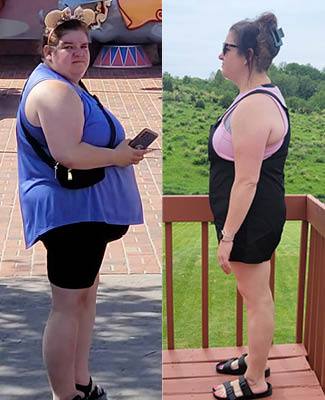-
Health & Wellness
Thriving, not just surviving, after bariatric surgery

A trip to Disney World in 2023 was an eye-opener for Katie Crow. It wasn't the rides, parades or immersive activities that caught her attention but that she struggled to have the energy to go to the amusement park every day.
"It wasn't the experience I wanted it to be. That's when I knew I finally needed to do something about my weight," says Katie, an endoscopy nurse with Mayo Clinic Health System in La Crosse, Wisconsin.
That summer, the 36-year-old saw her weight reach 296 pounds. Katie suffered from leg and back pain, had been diagnosed with severe sleep apnea, and her energy was at an all-time low. She also worried about developing diabetes and heart disease, which run in her family. Since 2019, she also had been coping with anxiety and depression.
"The worst part was I couldn't keep up with my kids," says Katie, the mother of three children, now ages 15, 13 and 3. "I was just surviving."
Exploring the options
No stranger to battling her weight, Katie had tried a slew of diets, but none were successful. In the spring of 2023, her primary care provider referred her to the Bariatric Surgery Department at Mayo Clinic Health System in La Crosse. There she learned about her options, which included weight-loss drugs and bariatric surgery.
"I considered the weight-loss drugs, but at the time, some hadn't been approved yet, and given the side effects, they didn't seem like an option for me," says Katie. "But the statistics showing the success of bariatric surgery sounded promising."
Katie hadn't decided on her next steps, and then came the Disney World trip. The trip turned out to be the push she needed to finalize her decision to proceed with surgery, even though she was nervous about the permanent nature of the procedure.
Choosing weight-loss surgery
With the decision made, Katie started her bariatric surgery journey, which included various consultations, a psychological examination and a two-week pre-op diet to prepare her body for the surgery. She also met with Kathriena Greenwell, M.D., who would perform the surgery.
"Dr. Greenwell took the time to answer all my questions and thoroughly explain the risks and benefits," says Katie.
"Katie was an excellent candidate for surgery. Since the surgery, she's been very motivated in her weight-loss goals, dedicated to the weight-management program and is taking her lifestyle changes seriously," says Dr. Greenwell.
In December 2023, Katie underwent surgery. While her body healed, she was on a restricted diet for six weeks.
"I thought I'd never eat real food again," says Katie. "But I'd made the commitment and was determined to make it work."

Making lifestyle changes
When she made her choice, Katie knew that this was a lifelong commitment. She decided to track her experience on social media, posting about the ups and downs of her weight loss and the changes she was making. The most noticeable was the pounds she was shedding. In five months, Katie lost 109 pounds and 84 inches off her body. She'd dropped from size 3X to large.
There were other changes, as well. Dr. Greenwell says Katie's body mass index, or BMI, has decreased from 49.26 to 31, and she no longer is considered morbidly obese. Dr. Greenwell also noted that Katie has stopped experiencing gastric reflux and anticipates that as she loses more weight, she won't require a continuous positive airway pressure, or CPAP, machine to treat her sleep apnea.
"Hopefully, by losing weight now while she's young, it will prevent her from developing the complications of obesity, including diabetes, heart disease and hypertension," says Dr. Greenwell.
Katie also has seen other personal victories beyond the numbers on the scale. Her leg and back pain are gone, she doesn't worry if a chair will hold her when she sits down, and she delights in shopping for clothes wherever she wants. Her anxiety and depression also have subsided.
"I have more energy than before," says Katie. "My goal is to get down to 150 pounds, but based on the way I feel now, I'd be happy staying at this weight. Bariatric surgery is a tool, but you still have to do the work every day. It requires mental toughness and dedication; I didn't realize how challenging it would be mentally."
For those considering weight-loss surgery, Katie advises researching the process and understanding the commitment you'll be making.
"Going in, you know that you're going to be on vitamins and supplements forever, you won't be able to tolerate certain foods, you need to monitor your protein and hydration, and you have to become a regular exerciser," says Katie. "But ultimately, you have to look at the bigger picture.
"I'm no longer just surviving; I'm thriving. I've become the mom I always dreamt of being," she says. "My only regret is that I didn't do this sooner."
This article first published on the Mayo Clinic Health System blog.
Related Articles







